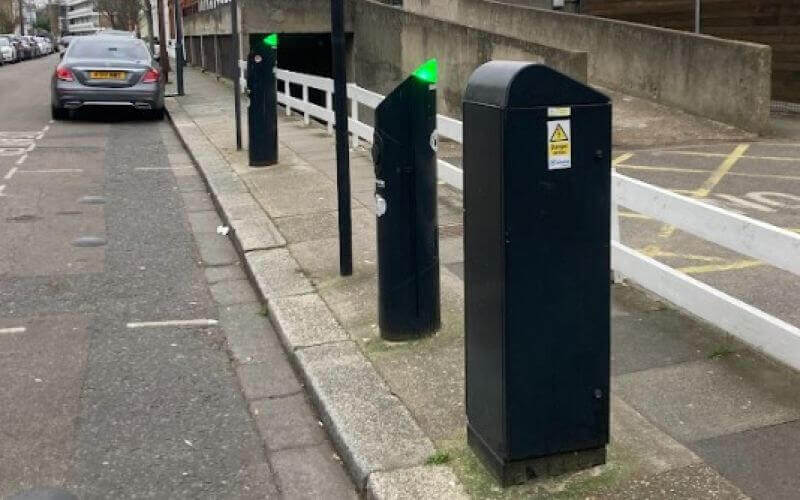The rollout of new charging points for electric vehicles is stripping vital pavement space away from pedestrians and wheelchair-users, two campaigning organisations have warned the government.
They also warn that almost none of the electric vehicle charging points (EVCPs) being installed are accessible to disabled drivers.
Their research across London has found that only four of London’s 32 boroughs have so far installed more EVCPs on roads than on pavements.
And only nine of the councils have clear planning policies that match best practice guidance, which says new chargers should be built on “kerb buildouts” in the road, and not take up vital space on pavements (pictured).
By October last year, London boroughs had installed at least 2,500 EVCPs on pavements – despite the government and Transport for London recommending this should not happen if avoidable – which was around four times as many as they had installed on kerb buildouts.
The Streetspace Invaders report has been written by climate action charity Possible, with support from disabled people’s organisation Wheels for Wellbeing.
They wrote this week to the government agency Active Travel England (ATE) and the Department for Transport’s Office for Zero Emission Vehicles (OZEV), asking them to take action.
They say the issues they found in London are likely to be repeated across England if action is not taken.
The government has said that about half a million public EVCPs will need to be installed by 2030 to meet demand from drivers under its net zero plans.
Possible and Wheels for Wellbeing say it is “much easier, cheaper and faster” for highways authorities to install EVCPs on pavements than on the road because planning consent is not needed for pavement installation whereas it is for those on roads.
Kerb buildouts can also cost more and take space that provides on-street parking revenue.
In their letter to ATE and OZEV, the two charities say: “The impacts of footway EVCPs are likely to be particularly severe for disabled pedestrians and wheelchair users, while almost none of the public EVCPs rolled out so far are accessible for disabled drivers.
“If the experience in London, which has led the UK in public EV charging provision, is emulated elsewhere, tens of thousands of new items of street furniture serving private motorists will be installed in scarce pedestrian space over the coming years – much of it with government funding.”
Among the recommendations in the report is for OZEV to make an “explicit presumption against” funding councils to put EVCPs on pavements, and for ATE to take similar measures.
They also want local councils to adopt “explicit policies” to site EVCPs on pavements only in exceptional circumstances.
Isabelle Clement, director of Wheels for Wellbeing, said: “Possible’s investigation has uncovered a new and totally avoidable access catastrophe.
“The rollout of EV chargepoints is welcome, but it’s fast eating away at footways across the capital, whilst simultaneously failing to provide accessible charging for disabled drivers.
“Disabled people already have to contend with poor-quality walking and wheeling environments including narrow pavements, cracked paving slabs, tree roots, street clutter, missing dropped kerbs and lack of tactile paving.
“Now councils are adding further access challenges by installing EV charging points on pavements.
“Once again, the Equality Act and the obligation not to disadvantage disabled people seems to have been ignored by the public bodies funding and delivering this infrastructure.
“We will support ATE and OZEV in ending this practice and ensuring that the roll out of EV chargepoints brings progress and greener mobility for all, rather than further limiting disabled people’s mobility.”
Leo Murray, co-director at Possible, said: “It is right that drivers without off-street parking are supported to switch to electric vehicles.
“However, it is deeply ironic that we are paying councils to enable private cars to invade precious pavement space in the name of the environment.
“Ensuring active travel is a viable option for all is just as important for meeting climate targets as changing the way cars are fuelled, but to do that, we need to be removing clutter from footways, not adding to it.”
The Department for Transport (DfT) said OZEV and ATE would be responding to the letter “in due course”.
ATE had not commented on the report by noon today (Thursday).
But a DfT spokesperson, speaking on behalf of OZEV, said: “The government is committed to ensuring everyone benefits from the transition to zero emission vehicles.
“Last year, the government worked with national disability charity Motability on new standards for publicly accessible chargepoints and we are actively encouraging the sector and local authorities to ensure plans carefully consider accessibility before they apply for grant schemes.”
Picture: Charging points photographed by Possible during its investigations
A note from the editor:
Please consider making a voluntary financial contribution to support the work of DNS and allow it to continue producing independent, carefully-researched news stories that focus on the lives and rights of disabled people and their user-led organisations.
Please do not contribute if you cannot afford to do so, and please note that DNS is not a charity. It is run and owned by disabled journalist John Pring and has been from its launch in April 2009.
Thank you for anything you can do to support the work of DNS…

 Not one electric vehicle public charging point across the UK meets government’s accessibility standard, say MPs
Not one electric vehicle public charging point across the UK meets government’s accessibility standard, say MPs Low traffic neighbourhoods can often damage disabled people’s independence, MPs are told
Low traffic neighbourhoods can often damage disabled people’s independence, MPs are told  Access to electric vehicle charging-points ‘is treated as inconvenient afterthought’
Access to electric vehicle charging-points ‘is treated as inconvenient afterthought’